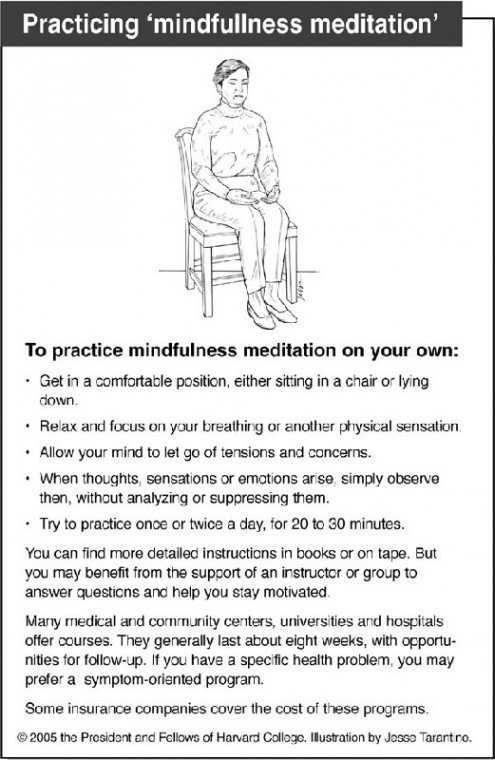Q: I’ve been hearing about the benefits of
”
mindfulness meditation.
”
What is it exactly, and can it really improve your health?
Q: I’ve been hearing about the benefits of “mindfulness meditation.” What is it exactly, and can it really improve your health?
A: Think about what goes on in your head during a typical day. Does your attention ever jump from one thing to another? Do you spend time second-guessing events from your past, or fretting about the future? What about half-listening while silently judging another’s words?
The practice of mindfulness attempts to quiet these common, distracting thoughts. It means paying attention to what you’re experiencing from moment to moment, without drifting into thoughts of the past, worries about the future or getting caught up in opinions about what’s going on.
One aspect of mindfulness practice is a discipline called mindfulness meditation (see accompanying sidebar). Practicing this each day can help enhance mindfulness in your daily life.
Mindfulness isn’t a new idea. It’s central to many religious traditions, such as Buddhism. But recently, it’s found a place in mainstream health care, as well as in non-medical settings, such as workplaces and schools. Why? There’s mounting evidence that cultivating mindfulness can help you enjoy life more, make it easier to cope with illness, and possibly boost your physical and emotional health. While it doesn’t replace traditional therapies and medications, it can lower stress and may help other treatments work better.
Measuring Mindfulness
To help define mindfulness, researchers at the University of Rochester developed a questionnaire (below) that gives people a sense of how much time they spend not being mindful. Would you agree or disagree with these statements:
n I find it difficult to stay focused on what’s happening in the present.
n I snack without paying much attention to what I’m eating.
n It seems I’m “running on automatic” without much awareness of what I’m doing.
n I rush through activities without being really attentive to them.
n I tend to walk quickly to get where I’m going without paying attention to what I experience along the way.
n I find myself listening to someone with one ear and doing something else at the same time.
n I tend not to notice physical tension or discomfort until they really grab my attention.
Mindfulness and Health
A study of nearly 1,500 people who answered the questionnaire found that those who were more mindful were also more likely to be more optimistic and happier. They also tended to be more open to new experiences and more satisfied with life.
Another study looked at workers in demanding jobs at a biotechnology firm, half of whom were enrolled in an eight-week mindfulness course. The other half (the control group) signed on to take it later. The mindfulness students had fewer negative emotions after the course, while those on the waiting list noticed no change. Compared to the controls, the mindfulness students also produced more antibodies to a flu vaccine.
Another study showed that a mindfulness-based course could help ease stress and improve sleep in women with breast cancer and men with prostate cancer.
Other studies have looked at how mindfulness training can affect people’s symptoms and their use of medical services. In the three months following a mindfulness course, patients reported almost half as many medical symptoms as those who received only educational materials on stress reduction. At an inner-city clinic, patients required far fewer medical visits in the year after a mindfulness course. Such training has also proved helpful to people with chronic pain, fibromyalgia, psoriasis and high blood pressure.
Mental health professionals are now incorporating mindfulness-based approaches into treatments for emotional disorders. Mindfulness training can help prevent a relapse of depression after it’s been successfully treated, according to two studies. The technique has also shown promise in controlling binge eating and obsessive-compulsive disorder, in which people try to alleviate uncomfortable thoughts by compulsive, repetitive behaviors.
Everyday Mindfulness
Here are some tips for integrating mindfulness into your daily life:
• When you do routine things that happen throughout the day, like answering the phone or buckling your seat belt, think about what you’re doing and observe yourself doing it.
• Pay attention to your breathing or your environment when you stop at red lights.
• Before you go to sleep, and when you awaken, take some “mindful” breaths. Instead of allowing your mind to wander over the day’s concerns, direct your attention to your breathing, thinking of nothing else.
• Find a task you usually do impatiently or unconsciously (standing in line or brushing your teeth, for example) and do it mindfully.
Being mindful doesn’t mean you’ll never “multi-task” or hurry, but you can do so consciously. You can’t banish upsetting thoughts or emotions, but you will have more insight into them and become aware of your choices in responding to them.
Submit questions to the Harvard Medical School Adviser at www.health.harvard.edu/adviser. Unfortunately, personal responses are not possible.













